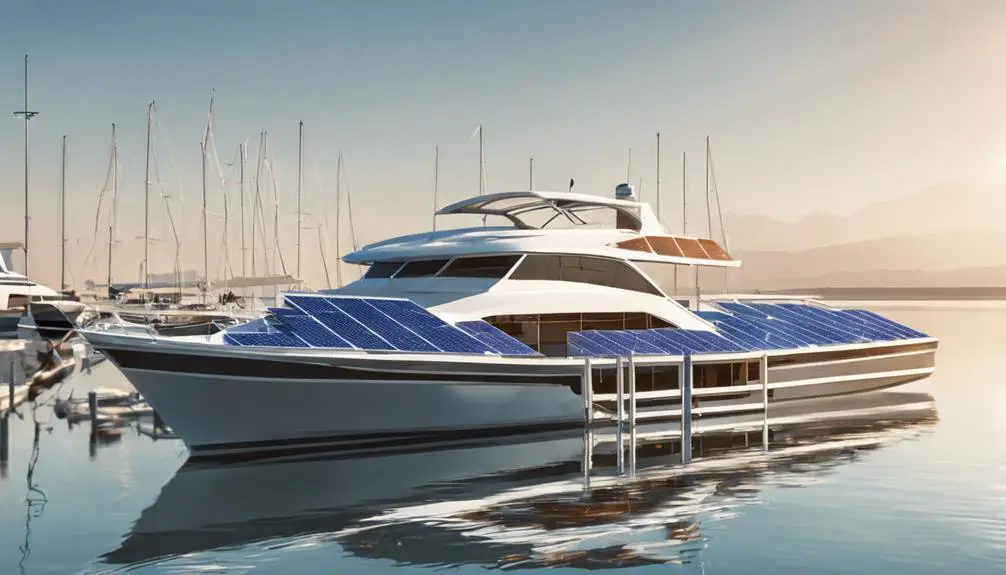When setting up solar panels on your boat, adhere to regulations meticulously. Conduct risk assessment, insulate connections, and use marine-grade materials. Evaluate environmental impact, reduce carbon footprint, and dispose of old panels properly. Understand licensing needs, get permits beforehand, and showcase electrical proficiency. Follow wiring guidelines for optimal performance, avoiding shading and using protection like charge controllers and fuses. Regularly clean and inspect for damage or loose connections. Address issues promptly for peak solar panel efficiency and safety.
Safety Standards for Solar Panel Installation
Ensure that all boat solar panel installations comply with safety standards to prevent potential hazards and ensure the proper functioning of the system. Safety protocols are crucial when installing solar panels on a boat to mitigate risks and ensure the safety of passengers and crew.
Before starting the installation process, it's essential to conduct a thorough risk assessment to identify potential hazards and implement appropriate safety measures.
When it comes to installation techniques, make sure that all electrical connections are properly insulated to prevent short circuits and electrical shocks. Securely mount the solar panels using marine-grade materials to withstand harsh marine conditions and prevent any loose panels that could pose a safety risk.
Additionally, follow manufacturer guidelines for installation to ensure optimal performance and longevity of the solar panel system.
Environmental Regulations and Compliance
Complying with environmental regulations and ensuring strict adherence to compliance standards is paramount when installing solar panels on boats. Conducting an environmental impact assessment before installation is crucial to evaluate the potential effects on the marine ecosystem. Monitoring compliance throughout the installation process guarantees that the project aligns with sustainability goals.
Incorporating renewable energy sources like solar panels contributes to energy efficiency on boats, reducing reliance on traditional fuel sources that harm the environment. By implementing solar panels, boat owners can decrease their carbon footprint and minimize pollution in water bodies.
Environmental regulations mandate the proper disposal of old or damaged solar panels to prevent environmental contamination. Compliance monitoring ensures that all guidelines regarding solar panel installation and maintenance are followed diligently.
Licensing and Permit Requirements
When installing solar panels on boats, it's imperative to understand and adhere to the specific licensing and permit requirements dictated by maritime authorities. Before proceeding with the installation, you must ensure that you have obtained the necessary permits. Permit applications typically involve submitting detailed plans of the solar panel installation, specifying the type and location of panels, and providing information on the electrical components to be used.
Maritime authorities also enforce licensing requirements for individuals conducting solar panel installations on boats. These licensing requirements may include demonstrating proficiency in electrical systems and solar panel installations. Additionally, there may be fees associated with obtaining the required licenses.
Inspections by maritime authorities are commonly conducted to ensure that the solar panel installation complies with safety standards and regulations. It's essential to schedule these inspections promptly after completing the installation to avoid any potential issues.
Guidelines for Proper Wiring and Mounting
Proper wiring and mounting of solar panels on boats require meticulous attention to detail to ensure optimal performance and safety. When positioning the panels, avoid shading from antennas, booms, or any other obstructions to maximize sun exposure.
It's crucial to maintain proper voltage protection by using a charge controller to prevent overcharging of the batteries. Additionally, fusing the wiring connections within the system is essential to protect against overcurrent situations that could lead to damage or fire hazards.
Ensure that the wiring is securely mounted and protected from chafing or exposure to the elements. Use marine-grade components for all connections and fastenings to withstand the harsh marine environment.
Properly route the wiring to avoid interference with other boat systems and maintain a clean, organized appearance. Regularly inspect the mounting hardware for signs of corrosion or loosening and address any issues promptly to prevent potential damage or failure.
Inspecting and Maintaining Boat Solar Panels
To ensure the optimal performance and longevity of your boat solar panel system, it's imperative to regularly inspect and maintain the panels.
Start by cleaning the solar panels with a soft cloth and mild detergent to remove any dirt, dust, or debris that may accumulate on the surface. It's crucial to inspect the panels for any signs of physical damage, such as cracks or scratches, which can impact their efficiency.
Troubleshooting solar panels involves checking the wiring connections for any loose or corroded parts that could disrupt the system's functionality. Ensure that the panels are securely mounted and that there are no obstructions blocking sunlight from reaching them.
Regularly monitor the output of the solar panels to identify any fluctuations or decreases in power generation, which may indicate a problem that needs to be addressed promptly.
Conclusion
In conclusion, ensuring compliance with boat solar panel regulations is crucial for safe and efficient operation.
Just like navigating through rough waters, following safety standards, environmental regulations, and proper installation guidelines will help steer you towards smooth sailing.
Remember to obtain the necessary licenses and permits, maintain and inspect your solar panels regularly, and adhere to proper wiring and mounting practices to keep your boat and the environment protected.
Happy sailing!
